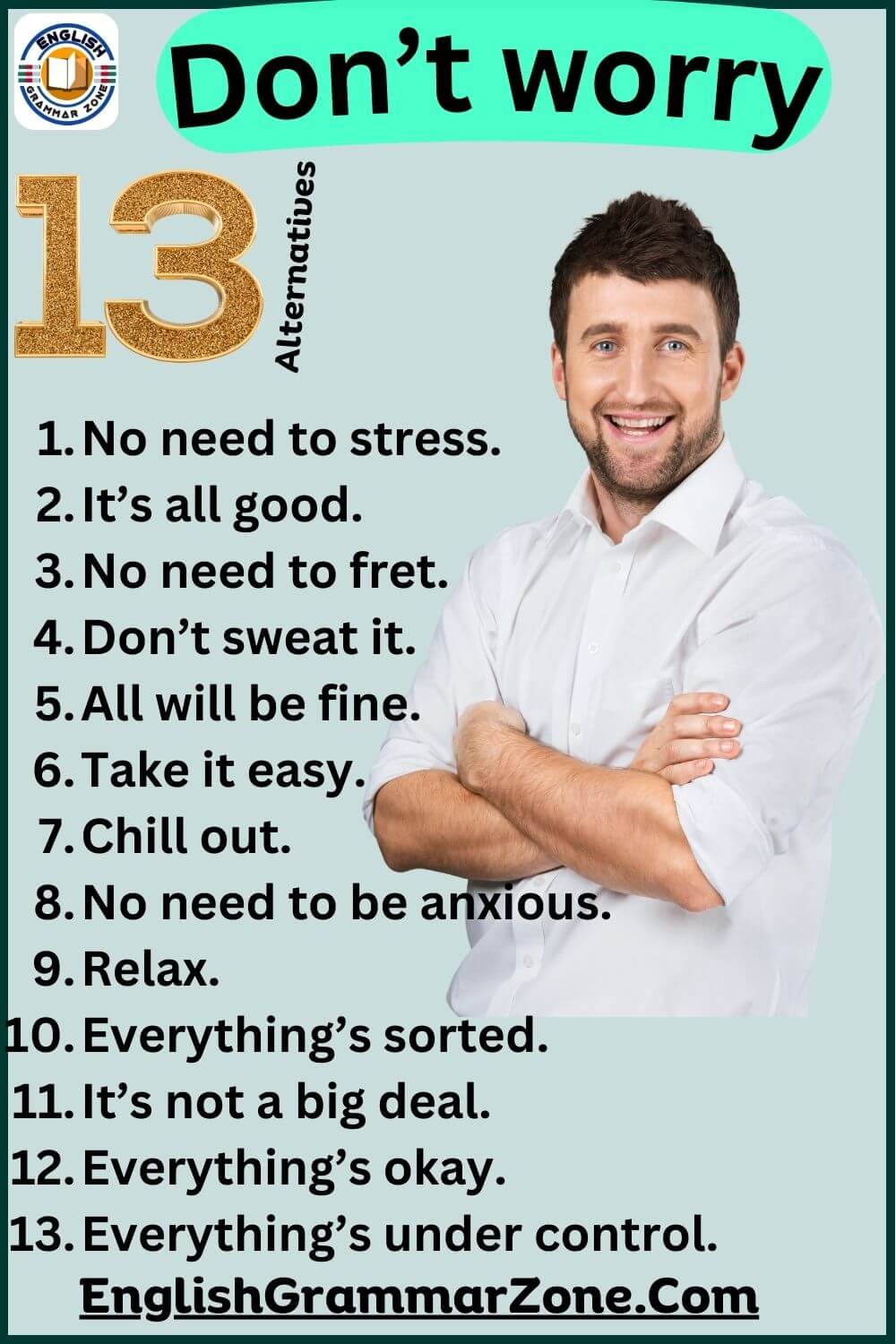Looking for Alternative ways to say don’t worry ? We’ve got you covered! Whether you’re comforting a friend or reassuring a colleague, there are plenty of ways to express the same sentiment without using the same phrase. In this article, we’ll explore 100 alternative ways to say don’t worry, giving you a variety of expressions that can suit any situation. Let’s dive into these helpful phrases to keep your conversations fresh and thoughtful.

- No need to stress.
- It’s all good.
- No need to fret.
- Everything’s under control.
- Don’t sweat it.
- All will be fine.
- Everything’s okay.
- Take it easy.
- Chill out.
- No need to be anxious.
- Relax.
- Everything’s sorted.
- It’s not a big deal.
- No need to be concerned.
- Don’t let it bother you.
- It’ll all work out.
- Stay calm.
- Nothing to worry about.
- We’ve got this.
- Everything’s in hand.
- No need to panic.
- It’s going to be alright.
- Take a breath.
- It’s all under control.
- Don’t get worked up.
- We’re handling it.
- All is well.
- You’re all set.
- No need to be uneasy.
- It’s going to be fine.
- Don’t get too worked up.
- Everything’s taken care of.
- Stay relaxed.
- Nothing to stress over.
- You’re in good hands.
- All’s well.
- Don’t be troubled.
- It’s nothing to worry about.
- You’re covered.
- No reason to be worried.
- Just breathe.
- Everything’s alright.
- Nothing to fret over.
- It’s all taken care of.
- Just relax.
- No need to be upset.
- It’s not worth stressing over.
- All’s under control.
- Don’t get too anxious.
- We’ve got it handled.
- It’s going to be okay.
- You’re good.
- No reason to worry.
- Everything’s going to be fine.
- You’re all good.
- No need to be distressed.
- We’ll manage it.
- Nothing to be concerned about.
- You’ve got nothing to worry about.
- All’s in order.
- Don’t let it get to you.
- Everything’s going smoothly.
- It’s not worth getting upset.
- You’re all set.
- We’ve got it under control.
- Everything’s going as planned.
- Don’t be concerned.
- It’s all worked out.
- It’s no trouble.
- Everything’s looking good.
- No need to get anxious.
- Everything’s fine.
- Don’t let it trouble you.
- It’s nothing to lose sleep over.
- All’s well that ends well.
- You’re in the clear.
- Everything’s just fine.
- No need to feel uneasy.
- We’re on top of it.
- Don’t worry about it.
- It’s all good to go.
- Everything’s on track.
- Nothing to be afraid of.
- No need to be nervous.
- It’s all sorted out.
- Everything’s proceeding smoothly.
- You’re in good shape.
- All is going well.
- Don’t be jittery.
- Everything’s okay and safe.
- No need to feel anxious.
- Everything’s proceeding as planned.
- All’s going according to plan.
- Nothing’s going wrong.
- We’ve got it all sorted.
- It’s not a problem.
- Everything’s on point.
- You have no reason to worry.
- All’s in good shape.
- Everything’s set and ready.
FAQs about 100 Alternative Ways to Say
What does it mean to have 100 alternative ways to say something?
It means finding different words, phrases, or expressions to replace a specific term or idea. For example, instead of saying “happy,” you could say “joyful,” “content,” or “cheerful.” These alternatives allow you to adapt your language to different contexts, tones, and audiences.
Why is learning alternative ways to say things important?
Learning alternatives is crucial because:
- Improves Communication: It helps you express yourself more clearly and precisely.
- Enhances Writing: Varied vocabulary makes your writing more engaging and professional.
- Builds Confidence: Having options ensures you’re never at a loss for words, whether in casual conversations or formal discussions.
How can I start using 100 alternative ways to say common phrases?
Here are three easy steps to begin:
- Learn Gradually: Focus on 5-10 new alternatives daily.
- Practice in Context: Use them in sentences or daily conversations.
- Review Regularly: Revisit and practice the words to reinforce them in your memory.
What are some examples of alternative ways to say common phrases?
Here are a few examples:
- Instead of “thank you,” say: “Much appreciated,” “I’m grateful,” or “Thanks a ton.”
- Instead of “good job,” say: “Well done,” “Excellent work,” or “Great effort.”
- Instead of “sorry,” say: “I apologize,” “My bad,” or “Please forgive me.”
Can using alternative phrases make you sound more professional?
Yes, using varied and appropriate expressions can significantly improve how others perceive you. For instance, saying “I appreciate your effort” instead of “Good job” sounds more professional and specific, especially in workplace settings.
Where can I find more examples of alternative ways to say things?
There are various resources to explore:
- Books on Vocabulary Building: Many books focus on improving word choice and style.
- Online Tools: Websites and apps like Thesaurus or Grammarly offer quick suggestions.
- Practice Articles and Blogs: Regularly read blogs, like this one, for practical examples.
How do alternative phrases improve creative writing?
In creative writing, variety is key to keeping readers interested. Using 100 alternative ways to say helps avoid repetition, making your story or essay vibrant and dynamic. For example, instead of always writing “he said,” you could use “he whispered,” “he exclaimed,” or “he murmured” to set the tone better.